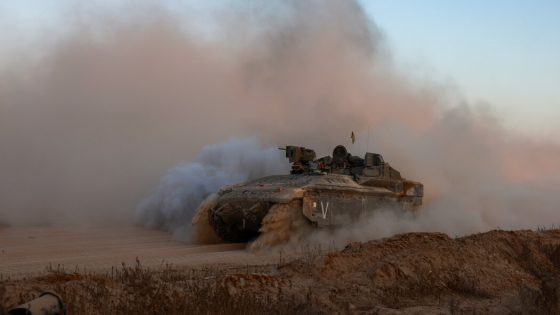A day after the Israeli military rescued four hostages held by Hamas militants in Nuseirat, Gazans described an intense bombardment during the raid, followed by chaos in the streets from an operation that killed and wounded scores of Palestinians.
Bayan Abu Amr, 32, was carrying her 18-month-old son Mohammad on the edge of Nuseirat’s main marketplace on Saturday when she was surrounded by the heavy booms of strikes from aircraft, which Israel’s military said targeted militants in an effort to ensure the safe extraction of the hostages and special forces.
“People were rushing like the day of judgment; I did not know where to run,” said Ms. Abu Amr, who was on her way to pay a condolence call to her uncle’s family after two of his sons had died. “Kids were screaming, women were falling down while running.”
Along with other Gazans, she managed to clamber onto a passing pickup truck that was trying to ferry people safely out amid the strikes, she recalled. One girl was separated from her mother in the confusion, while an old man lost his grip and fell off the truck onto the ground, she said.
Ms. Abu Amr finally arrived home with her son hours later, shocked that she was still alive. “I won’t take my son out of the house again,” she said.
To rescue the hostages, Israeli troops entered two residential buildings in which they were being held, according to Rear Adm. Daniel Hagari, the Israeli military spokesman. Admiral Hagari said there were families living in the apartments, as well as armed Hamas militants guarding the hostages, making it “impossible to reach them without harming the civilians of Gaza.”
The precise death toll remained unclear as health officials sought to gather statistics amid chaotic scenes at hospitals. Gazan health officials reported that more than 200 people were killed in the raid; the Israeli military said it was aware of fewer than 100 casualties, without specifying whether these were dead or wounded or both. Neither side provided a breakdown of combatants versus civilians.
On Sunday, the corridors and hallways of the last major medical center in central Gaza, Al-Aqsa Martyrs Hospital in Deir al-Balah, remained “densely crowded” with new patients, after more than 100 dead bodies had been brought there on Saturday, said Khalil Daqran, a hospital official. Most of the bodies had since been buried or claimed by relatives, he added.
The medical facility — already packed before the Israeli rescue mission in nearby Nuseirat — overflowed, said Abdelkarim al-Harazin, 28, a physician working there.
“The bombing was unimaginably intense,” said Dr. al-Harazin. “The whole hospital became one giant emergency room, even as people came looking for their dead relatives.”
When Al-Aqsa became overwhelmed, many of the wounded were sent to a nearby field hospital operated by the International Medical Corps, according to Javed Ali, an official with the aid group.
Diana Abu Shaban, 28, first heard gunfire as she was about to hang laundry near the tent where she was sheltering in Nuseirat. As the assault escalated, she told her daughters to hide before realizing that the frail tent could not protect them. Gathering her children, she sprinted to the nearby Al-Awda medical center in a desperate search for safety.
She said her husband, Saeed, had left earlier that morning for the market, where Palestinian residents said the strikes were particularly intense.
“I heard lots and lots of missiles,” Ms. Abu Shaban said. “I thought my husband would be killed or injured.”
After two hours, the bombing died down and she and her children left the hospital, she said. Later, they discovered that her husband had survived by hiding in a nearby shop.
Abd Al-Rahman Basem al-Masri, 25, who lives on the northern edge of Deir al-Balah, said Saturday had been the worst day he’d witnessed since the start of the war.
Mr. al-Masri said he, his mother and his younger brother had driven back from his uncle’s house and were approaching their home when an airstrike pounded into the ground beside it.
In a video shot by a friend who was also in the car, an expanding cloud of smoke can be seen rising behind the building. “In that moment, I lost hope that we can continue to live here,” Mr. al-Masri said.
Another Gazan who lives in Nuseirat, who spoke on condition of anonymity for fear of retribution, said he and more than 10 family members hid inside for hours as heavy airstrikes rattled the neighborhood. He said he had no idea hostages had been held in the area.
After the bombing subsided, he headed out into the devastated market area, where he said he saw the street covered in blood and bodies. Gazans there were cursing not just Israel, but Hamas as well, he said, blaming them for bringing this disaster upon them.
He said neither Israel nor Hamas cared about the destruction as they sought to attack one another. Everyday people, he added, were the victims.
Source Agencies



